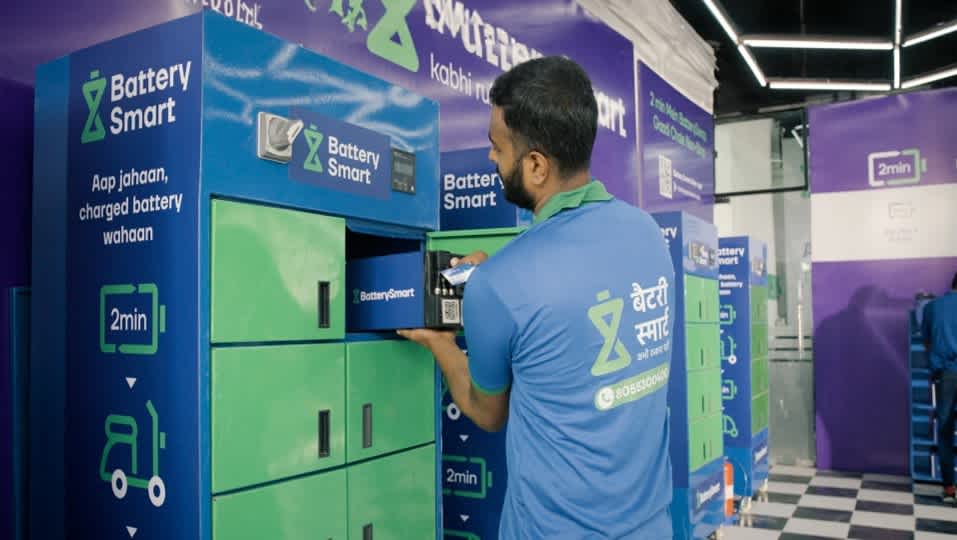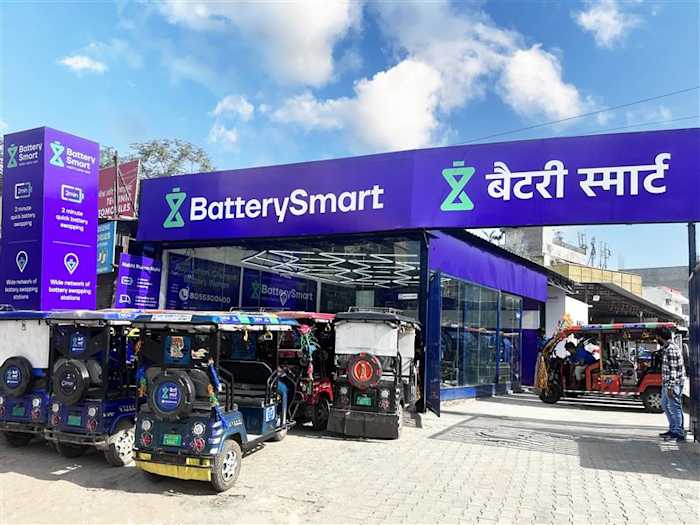PORTFOLIO COMPANY PROFILE
Battery Smart – A decentralized infrastructure model
Founded in 2019, Battery Smart is India’s largest operator of battery-swapping stations for electric two- and three wheelers1. The company serves a market segment overlooked by traditional charging infrastructure: informal, low-income drivers of e-rickshaws and delivery vehicles operating in congested urban areas.
With more than 1,400 stations in over 35 cities and a rapidly growing base of more than 60,000 active users, Battery Smart has built a decentralized, franchise-led network model that integrates local microentrepreneurs and shopkeepers as station partners. This model:
Leverages local shopkeepers as station partners
Enables community-level job creation
Provides fast, grid-efficient electrification
Avoids large capex requirements
The firm’s battery-as-a-service (BaaS) platform allows users to exchange depleted batteries for fully charged units in under two minutes, thereby maximizing vehicle uptime - essential for drivers who earn on a per-trip basis.

Accelerating low-income decarbonization
Battery Smart’s business model directly supports emission reductions in a segment where formal finance and infrastructure are absent. By facilitating the electrification of small-format vehicles used for commercial transport, the company enables:
Avoidance of CO2 and black carbon emissions from ICE vehicles2
Reduction in urban air pollution (PM2.5 and NOx)3
Increased daily earnings for informal-sector drivers through fuel cost savings
Improved access to mobility and employment opportunities in underserved areas
The model supports India's national e-mobility objectives while delivering tangible improvements in local quality of life.
Catalytic capital for systemic change

In 2024, responsAbility committed total funding of USD 25 million to Battery Smart, with the explicit purpose of supporting expansion into smaller urban centers – Tier 2 and Tier 3 cities – where financial and physical infrastructure gaps are more acute. Beyond targeting a sound return, the Fund’s investment also plays a catalytic role in validating a model for equitable climate infrastructure. This is instrumental in de-risking the ecosystem for mainstream capital and crowding in further future investments.
“Our goal is to make EVs accessible to every delivery rider and e-rickshaw driver in India. This investment helps us to take a model that works – and bring it to communities where no other charging solution exists. It is about scale, yes, but more importantly, it is about inclusion.” PULKIT KHURANA, CEO & Co-Founder, Battery Smart
“Battery Smart exemplifies how small-format infrastructure, if well designed, can deliver outsized impact. The value here is not in technological novelty, but in creating a reliable, scalable system that works for people typically excluded from energy transition narratives.” KEWAL SHAH, Investment Officer, responsAbility
“Battery swapping offers a practical pathway to scale electric mobility in India, particularly in high-use segments. By providing a chemistry-agnostic, reliable solution, this platform enables faster EV deployment in the rapidly growing three-wheeler market. It is a climate-positive innovation that addresses both global emissions and local air quality, critical for a just and accelerated energy transition.” AMIT SEMWAL, Climate Advisory Specialist, responsAbility
Sources: 1 All data, statistics, and statements related to Battery Smart mentioned in the following text are provided directly by Battery Smart. 2 Fine air pollution caused by incomplete combustion of fossil fuels. 3 PM2.5 refers to fine particulate matter smaller than 2.5 microns, linked to respiratory and cardiovascular issues. NOx refers to nitrogen oxides, a group of harmful gases contributing to smog and acid rain.